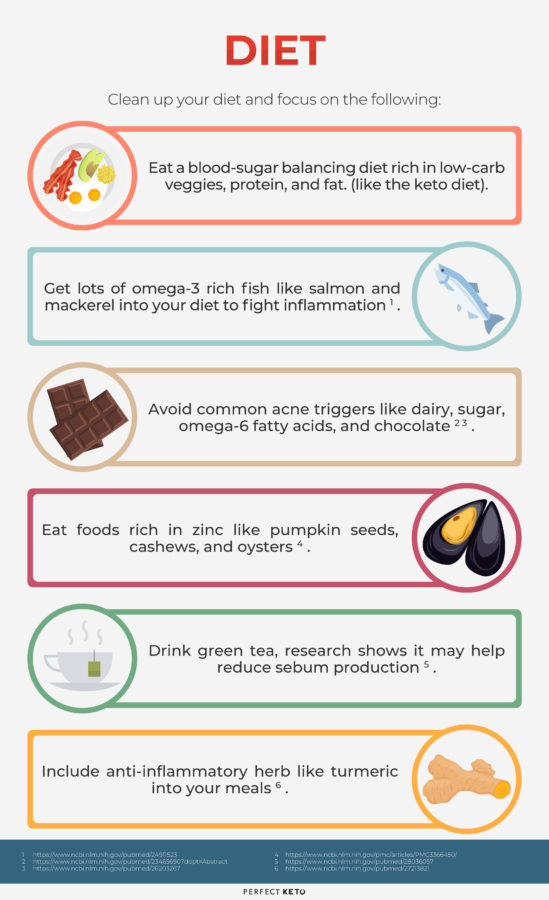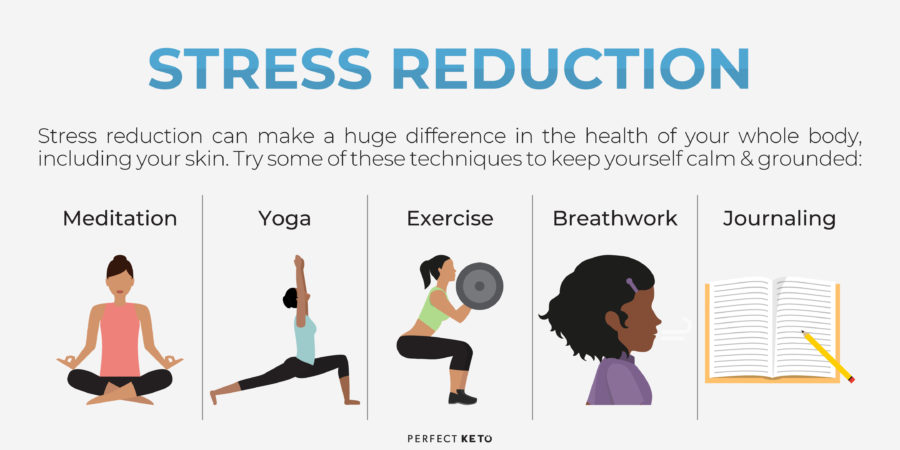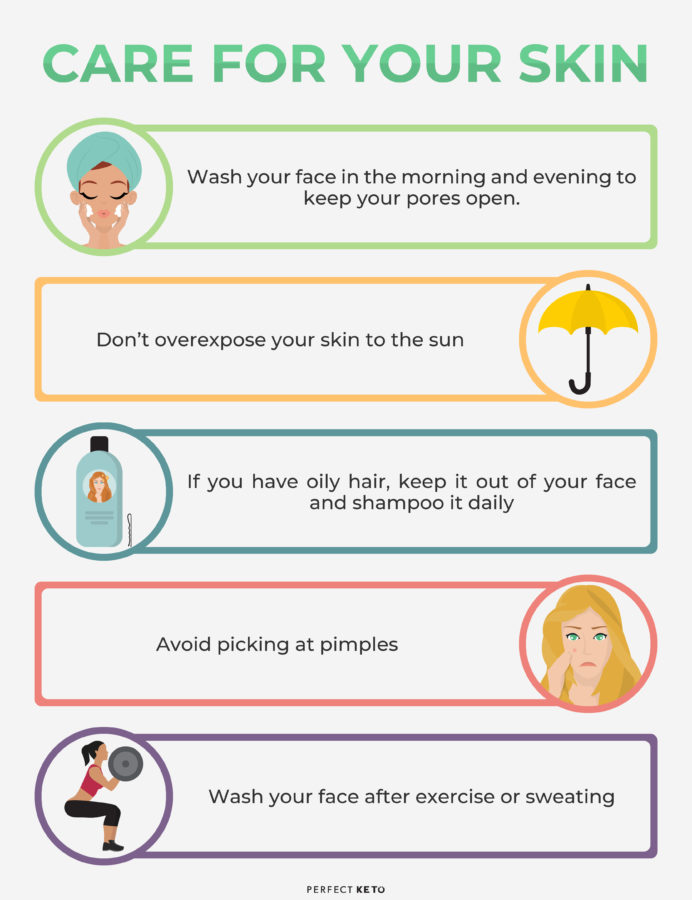If you struggle with skin issues you’ve probably tried every trick in the book to attain clearer skin. From topical treatments, to pharmaceuticals, to birth control for hormonal acne — there’s no shortage of acne-fighting solutions out there, but how safe are they in the long run?
If you want healthy skin you may need to look beyond the topical route, and start focusing on getting at it from the inside-out.
In addition to a diet that supports skin health dietary supplements can offer excellent support for your skin if you know what the root cause of your acne is.
Let’s take a look at what causes acne, and which supplements may best support you.
What Is Acne and What Causes It?
Unless you were one of the lucky few who skates by adolescents without a blemish, you’ve most likely experienced acne at some point in your life. Acne typically occurs around the teenage years, but adult onset acne is actually becoming more prevalent[*].
Those unpleasant red bumps that appear on your skin may be a hit to your confidence, but where does acne come from, and what is it exactly?
Acne forms when the pores in your skin get clogged with dead skin cells, bacteria, and an oily substance called sebum. Sebum is secreted from your sebaceous glands, which can be found throughout your whole body. Sebum keeps your skin and hair moist and healthy, but when you have an excess of it problems can occur[*].
Skin blemishes can come in a few different forms, depending on how and with what your pores become clogged[*]:
- Whiteheads – Whiteheads happen when your clogged pores are hidden under the skin. The material doesn’t break through the skin wall, so a firm white bump appears on the surface of your skin.
- Blackheads – Blackheads happen when the backed-up material in your pores stretch the opening of your pore and become exposed to air. The black discoloration comes from the oxidation of the gland products, not dirt.
- Pimples- Pimples form when the clogged pore remains backed up and becomes irritated. This causes inflammation and redness in the surrounding tissues, and there are usually bacteria involved.
- Cystic Acne- If pimples progress they can become filled with a fluid-like substance, forming cysts. This typically happens in more severe cases of acne.
You may be wondering what causes acne in the first place. Unfortunately, there’s no cut and dry answer as to why some people suffer from acne and others don’t. However, there are a few factors that come into play in the progression of acne which can be helpful to know about.
#1 Hormones
Hormonal imbalance can play a significant role in the onset of acne. Two types of hormones in particular; androgen (sex) hormones, and insulin (blood sugar) hormones can increase sebum production, leading to clogged pores[*][*].
Insulin-like growth factor (IGF-1), is a hormone that’s been well studied and tied to the onset of acne. This hormone not only increases sebum production, but it can also cause inflammation[*].
#2 Genetics
Genetic predisposition is never a life sentence, but if you have a close family member with acne, it’s wise to take preventative steps.
Research shows that if you have a first-degree family member with acne (mom, dad, or siblings), then your chance of having acne increases 50-80%[*][*].
#3 Stress
Stress is a factor that most people don’t think about when it comes to acne, but your state of mind can affect your body in more ways than you could imagine.
Research shows that when you’re stressed, the nerves in your skin can release pro-inflammatory chemicals. Depending on the person, these pro-inflammatory chemicals can cause an onset or worsen the case of acne[*][*].
This is just another example of the astounding connection between your mind and body.
#4 Diet
Diet plays a huge role in the onset, exacerbation, and prevention of acne. Specific foods like dairy, chocolate, sugar, and omega-6 rich vegetable oils are known to aggravate acne[*].
These foods can trigger hormonal changes and inflammation, which can lead to an initiation of acne, or worsening symptoms[*][*][*].
Sugar and processed carbs have an effect on your blood glucose, triggering the hormones insulin and IGF-1. This pathway leads to an increase in sebum production and inflammation[*]. If that isn’t bad enough, increased insulin can also lead to more androgen production — further increasing your sebum production[*].
In contrast, a low-carb diet that doesn’t trigger an influx of these hormones can improve acne, leaving you with clearer, healthier skin[*].
Problems with Pharmaceuticals for Acne
If you have acne prone skin you’ve most likely consulted a healthcare professional for medical advice around skin care.
There are several pharmaceutical drugs that can help fight off your acne, but they often come at a pretty high cost to your health. Like most quick fixes, the results may seem impressive at first, but over the long run you’re not doing yourself and the health of your body any favors.
Whether it’s balancing hormones, stress, or inflammation — these drugs may get the job done, but they don’t address the underlying cause of your acne.
Here are some of the most common pharmaceutical methods for treating acne, and the potential downsides.
#1 Birth Control Pills
Birth control pills work by altering your normal hormonal cycle and making it harder for sperm to fertilize your eggs. For women with hormone imbalance, taking birth control can improve symptoms of acne and help clear skin by balancing androgen production[*].
The downside is that birth control pills come with a host of side effects. Yaz, a common birth control given to women with acne comes with a long list of potential side effects including[*]:
- Headache
- Nausea
- Vomiting
- Bloating
- Cramps
- Fatigue
- Irritability
- Mood changes
- Loss of hair
- And more
#2 Antibiotics
Antibiotics are given to people with acne to fight off bacteria and inflammation. The issue with antibiotics and overall health runs deep, but in a nutshell;
When you take antibiotics, they kill off the bacteria in your body. The problem is; they don’t care if it’s good bacteria or bad bacteria — they just get in there and do a clean sweep. The natural balance of the bacteria in your gut is essential for the health and strength of your gut lining.
When your gut lining is weakened or vulnerable, you end up absorbing compounds, chemicals, and microbes that don’t belong in your body. This elicits an immune response, and from there you can be hit with all kinds of issues from digestive disturbance to autoimmune disease[*][*].
#3 Antibacterials
Antibacterial medications like benzoyl peroxide can help diminish the bacteria that cause acne. However, the side effects of this treatment can leave your skin red, itchy, irritated, and flaky.
#4 Accutane
Accutane, also called Isotretinoin, is a powerful acne treatment drug. Accutane is usually given to people as a last resort to severe acne that resists other treatments like antibiotics. Most of the side effects of Accutane are due to its drying effect on the body, and include:
- Chapped lips
- Dry skin and itching
- Nose bleeds
- Irritation and itching of the eyes
- Decreased night vision
- Sun sensitivity
- Depression and suicidal thoughts
However, the most damaging side effect of Accutane is serious birth defects. For this reason, women who take Accutane have to also be on birth control[*].
The pay off of clear skin for potential birth defects, autoimmune disease, and a multitude of other possible side effects seems like a steep price to pay. Luckily there are several natural supplements you can try before going down the pharmaceutical route.
6 Natural Supplements to Help Banish Acne For Good
Below is a list of natural remedies to treat acne from the inside out.
#1 Fish Oil
Fish oil is an excellent source of omega-3 fatty acids. This type of fat helps calm inflammation in your body and balances out your ratio of omega-6 fatty acids to omega-3 fatty acids. Omega-6 fatty acids in excess can be inflammatory, and the Western diet tends to be very omega-6 forward — so sneaking in omega-3’s where you can is essential for optimal balance[*].
Due to their anti-inflammatory effect, societies that consume higher amounts of omega-3’s tend to have a much lower incidence of acne. Research suggests that taking fish oil supplements daily can improve skin health, and is especially beneficial for individuals with moderate to severe acne[*].
#2 Maca
Maca is a root that’s traditionally grown in Peru and has been used in folk medicine for thousands of years for strength and endurance.
One of the benefits of maca is its adaptogenic properties, meaning it can help balance your stress response. Since stress is one of the primary causes of acne, keeping your nerves calm is crucial if you want to keep your face clear.
Two ways that maca may help balance your bodies stress response is by regulating blood pressure and reducing feelings of depression[*].
#3 Zinc
Zinc is one of the most widely studied forms of acne treatment. This mineral is involved in a myriad of complex processes in your body and has been used as a therapeutic nutrient for centuries.
Both topical and oral forms of zinc are effective at treating moderate to severe acne due to its anti-inflammatory properties. For severe acne, however, oral zinc supplementation tends to work best[*].
Zinc may also reduce levels of the androgen hormone dihydrotestosterone (DHT). DHT is secreted by your sebaceous glands and can contribute to the clogging of your pores[*][*].
#4 Chlorella
Chlorella is a type of green algae, loaded with nutrients and phytonutrients that typically grows in freshwater.
Due to its rich mineral composition, chlorella is known to have beneficial effects on hair and skin.
In one study, researchers examined the effects of chlorella on acne as a replacement for antibiotic therapy. The in vitro study found that chlorella had an inhibitory effect on the bacterial strain Propionibacterium acne, which is commonly responsible for the progression of acne.
It also exhibited anti-inflammatory and antioxidant properties which could further help alleviate acne breakouts[*].
Chlorella may also be helpful in balancing your blood sugar. People with high-risk factors for lifestyle diseases like diabetes saw a decrease in blood sugar after supplementing with chlorella. Keeping your blood sugar stable prevents the disruption of hormones that can lead to excess sebum production, which can ultimately result in acne[*].
#5 Ashwagandha
As you learned earlier, stress is one of the primary causes of acne. Counter-intuitive as it may seem, what goes on in your mind can actually affect your skin and cause acne breakouts.
One of the most well-known benefits of ashwagandha is its ability to help you manage and cope with stress. In fact, this herb’s been used for thousands of years in Eastern culture has been compared to pharmaceutical grade anti-anxiety medications[*].
If you believe that stress may be contributing to an acne breakout, grab some ashwagandha. You can take it in capsules, as a tea, or in powdered form. Studies have shown that this adaptogenic herb can lower cortisol levels, which will leave you feeling more calm, focused, and hopefully acne free[*].
#6 Bitter Melon
Bitter melon is a staple in Asian cuisine but taken mostly as a supplement in the West. If you’re feeling adventurous head over to your local Asian market, they usually have bitter melon that you can buy and cook up at home.
Research shows that bitter melon can reduce blood sugar, and help with insulin control in people with diabetes[*].
In addition to its blood sugar regulating qualities, bitter melon is also rich in anti-inflammatory compounds[*]. Hitting acne from two angels; inflammation plus blood sugar control, bitter melon is a great supplement to include if your acne is due to metabolic or inflammatory disturbances.
Other Ways to Help Battle Acne
Supplements can offer great support if you’re battling acne, but there are some other essential lifestyle and diet modifications that you can do if you really want to make a lasting change in the health of your skin.
Diet
Clean up your diet and focus on the following:

- Eat a blood-sugar balancing diet rich in low-carb veggies, protein, and fat. (like the keto diet).
- Get lots of omega-3 rich fish like salmon and mackerel into your diet to fight inflammation[*].
- Avoid common acne triggers like dairy, sugar, omega-6 fatty acids, and chocolate [*][*].
- Eat foods rich in zinc like pumpkin seeds, cashews, and oysters[*].
- Drink green tea, research shows it may help reduce sebum production[*].
- Include anti-inflammatory herb like turmeric into your meals[*].
Stress Reduction
Stress reduction can make a huge difference in the health of your whole body, including your skin. Try some of these techniques to keep yourself calm and grounded:

- Meditation
- Yoga
- Exercise
- Breathwork
- Journaling
Care For Your Skin

- Wash your face in the morning and evening to keep your pores open.
- Don’t overexpose your skin to the sun
- If you have oily hair, keep it out of your face and shampoo it daily
- Avoid picking at pimples
- Wash your face after exercise or sweating
The Takeaway: Supplements for Acne
A good skin care routine is always going to be essential for keeping acne at bay, but getting at skin health from the inside out is a great way to prevent breakouts and keep your skin glowing.
Dietary supplements that help fight inflammation, keep your hormones balanced, reduce emotional stress, and help you maintain steady blood sugar are excellent allies in the acne battle.
Depending on what’s at the root of your skin condition, you may want to go down one road or another, but here is a quick breakdown of supplements that can help you fight acne:
For stress — Ashwagandha, maca
For blood sugar balance — Bitter melon, chlorella
For Inflammation — Bitter melon, chlorella, zinc, fish oil
For hormone balance — Zinc
In addition, lifestyle changes like following a low-carb diet, managing stress, and having good skin care practices can help to clear up your acne and impact the health of your skin.